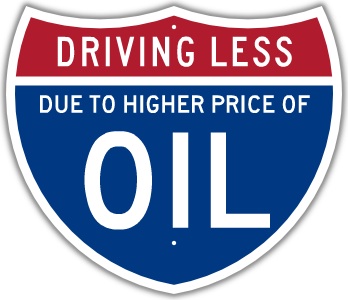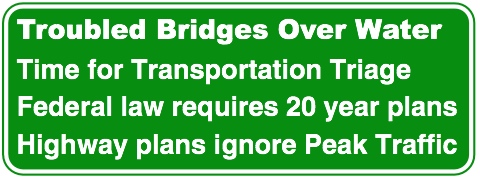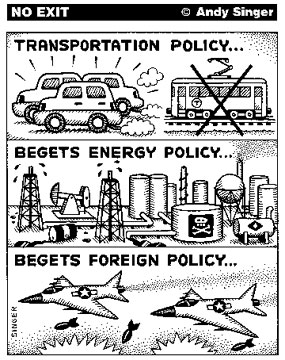 100 mpg cars are here
100 mpg cars are here
but they cannot solve oil dependency
100 miles per gallon = 42.5 kilometers per liter
100 miles = 160 kilometers
1 gallon = 3.78 liters
related pages:
- 55 mph speed limit would reduce US oil usage more than Alaska Pipeline
- Electric Cars: nice technology but it won't replace existing systems
In 2012, the Obama administration enacted a policy that fuel efficiency standards will increase to about 55 mpg by the year 2025, long after they are no longer in office. Will gasoline rationing start before this date?
The Environmental Impact of The Car, a 1992 report from Greenpeace, describes the numerous ecological impacts of petroleum extraction, oil wars, air pollution and other car related threats, and includes practical suggestions for alternative and efficient transportation.
| Efficiency of Cars Not Yet For Sale | MPG (Highway) |
| Toyota AXV | 110 |
| Renault Vesta2 | 107 |
| GM Ultralite | 100 |
| VW VW-E80 | 99 |
| Ford (unnamed) | 92 |
| Peugeot VERA+ | 87 |
| Volvo LCP 2000 | 81 |
| Renault EVE+ | 81 |
| GM TPC | 74 |
| Source: Greenpeace, "The Environmental Impact of the Car" (1992) | |
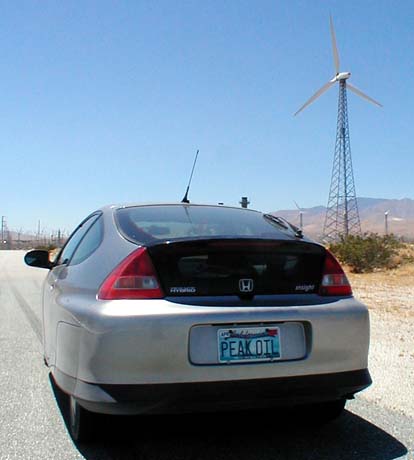 The energy bill passed by the U.S. Congress and signed into law by Bush in December, 2007 includes a requirement for increasing the fuel efficiency standard for cars to 35 miles per gallon by the year 2020. This is the first efficiency increase since the administration of George Bush the First (there were not any efficiency increases mandated during the eight years of Clinton / Gore, not even when the Democrats controlled both houses of Congress).
The energy bill passed by the U.S. Congress and signed into law by Bush in December, 2007 includes a requirement for increasing the fuel efficiency standard for cars to 35 miles per gallon by the year 2020. This is the first efficiency increase since the administration of George Bush the First (there were not any efficiency increases mandated during the eight years of Clinton / Gore, not even when the Democrats controlled both houses of Congress).
Few media stories about this 2007 efficiency mandate noted
- most of the politicians promoting it will be out of office by the time this deadline arrives,
- it would not take over a decade to retool car factories to meet this new requirement,
- Peak Oil makes it nearly certain that faster requirements for efficiency will be required long before 2020,
- the US could immediately reduce oil consumption by an estimated 4% by rolling back highway speed limits to 55 mph (90 kph), a policy originally enacted by Richard Nixon in the wake of the 1973 Saudi Oil Embargo. This would reduce more oil consumption than the current flow through the Alaska Pipeline and would not require any technological innovations, merely psychological acceptance of the need for conservation. (statistic source: "Saving Oil in a Hurry: Oil Demand Restraint in Transport," by International Energy Agency, Workshop: Managing Oil Demand in Transport, Paris, 7-8 March, 2005)
No
need to wait to make cars more efficient |
2004 Presidential candidate Howard Dean: "I support an across-the-board corporate average fuel economy (CAFE) standard of 37.5 mpg by 2015. This would apply to all passenger vehicles, and would require a closing of the SUV loophole. By harnessing Americans' unparalleled ingenuity, we can move our nation towards a clean and efficient energy economy - one that will stimulate economic growth, reduce our reliance on Middle East oil, and protect the environment."
2015 would be well after the second term for a new President elected in 2004. 37 mpg is woefully inadequate given existing technology that is much more efficient.
We don't need any new technology for more efficient cars - just new politics. However, cars capable of 100 miles per gallon (42 kilometers per liter) aren't "sustainable," merely efficient.
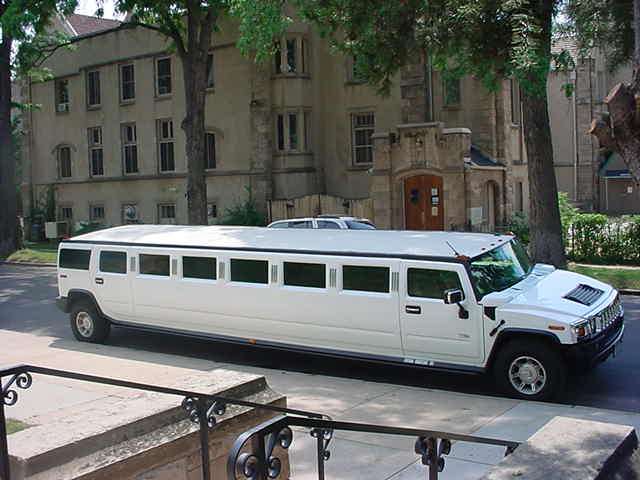
the Hummer limosine
the latest trend for conspicuous overconsumption of dwindling resources is the Hummer Stretch Limousine
www.limousine-denver.com/hummer-limos.htm
has some nice photos of these behemoths
no mention of how many gallons per mile they require
(if you are concerned about their fuel consumption, you probably won't be
renting a Hummer Stretch Limo)
One assumes their manufacturers and owners are completely clueless about oil depletion.
Hummer limos are one of our civilization's parallels to the social reaction to ecological overshoot on Easter Island, whose inhabitants stripped the forests, reducing the island's capacity to support their society. As ecological collapse accelerated, the society's elites developed fancier and fancier methods of showing off their wealth with distractions (giant statues) that diverted energy from looking at their problems. When it was all over, their descendents couldn't remember a time when the island was forested.
How will our great-great-great-great-grandchildren remember the age of oil? Will we use some of the remaining oil as a "bridge" toward a more harmonious, less unsustainable society? It takes energy to make solar panels and windmills, and it will take energy to relocalize food production.





